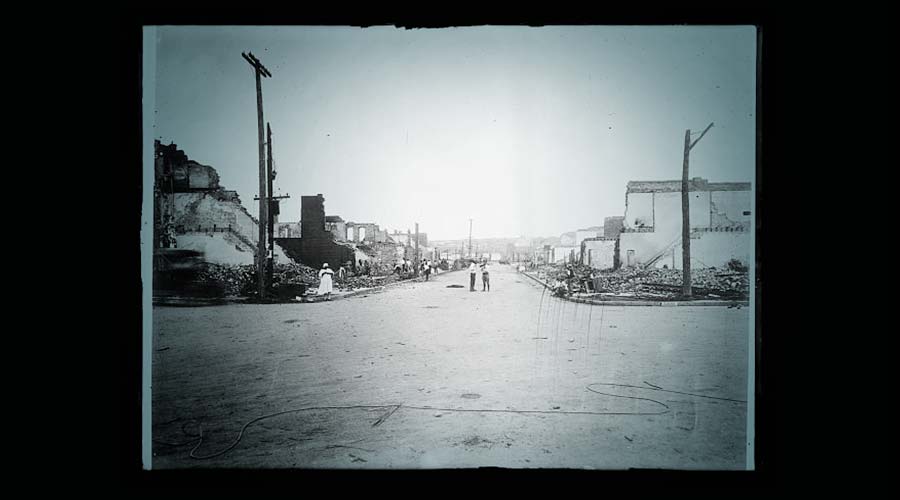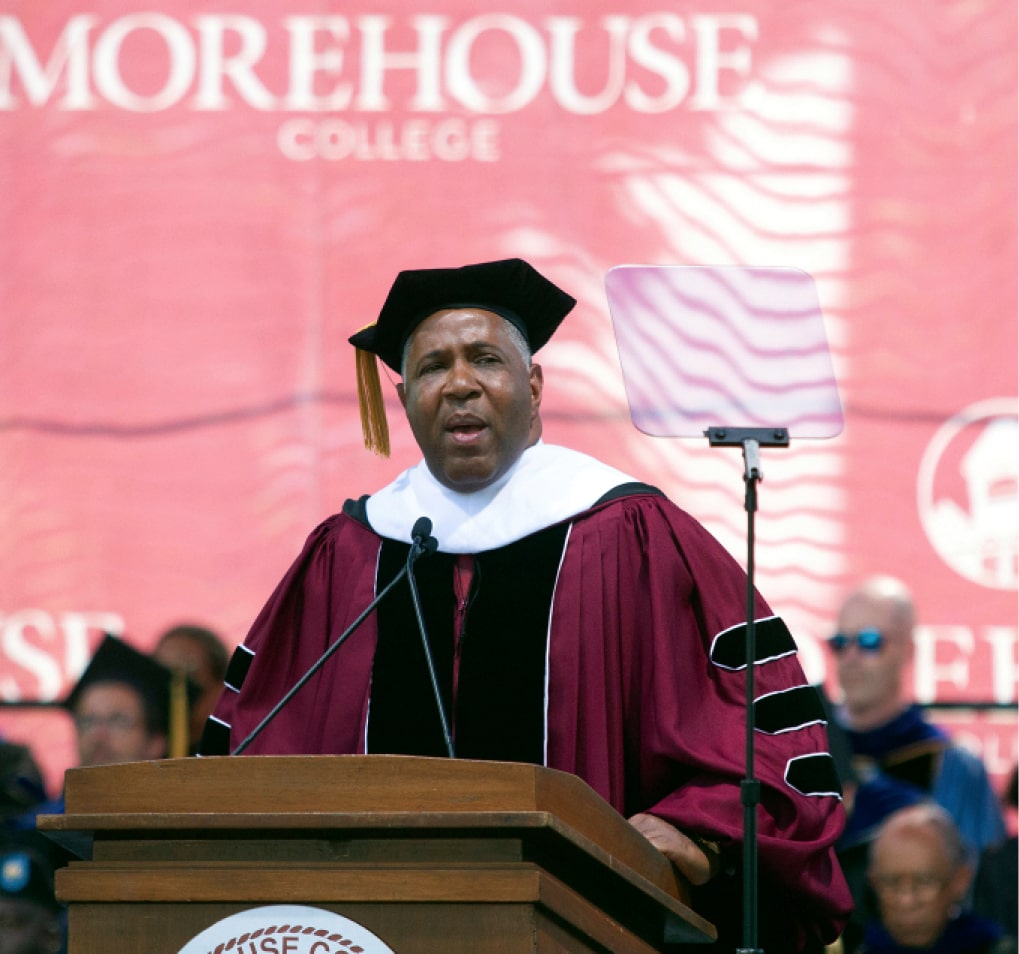June 1, 2021 marked the 100th anniversary of the conclusion of the Tulsa Race Massacre. Spanning three days, the Tulsa Race Massacre leveled the booming African American neighborhood of Greenwood near Tulsa, Oklahoma, leaving hundreds dead and thousands of livelihoods ruined. A May 2021 Forbes article, “The Epic Rise Of Black Wall Street And The Entrepreneurs Who Built It,” highlights not only the violence of the events but also the prosperity of Greenwood and its founders before the massacre. It also explores, in painstaking detail, the events of the final day of the riot and its aftermath:
“At 5 a.m. the mob began a full-bore assault on Black Wall Street. Some eyewitnesses, in accounts from the 2001 Commission to study the Tulsa Race Riot of 1921, reported that kerosene bombs were dropped from airplanes to demolish buildings, and when the assault was over, as many as 50 whites and 200 Blacks were dead, and more than 35 square blocks had been destroyed. Those who survived the riot were rounded up by the National Guard and put in internment centers for many weeks and months. Greenwood’s total property loss neared $2 million (over $50 million now), according to some estimates.”
While the tragedy in Greenwood should be something forever ingrained in the national record, many Americans have never heard of the Tulsa Race Massacre or the similar acts of racist violence against African Americans that plagued the 19th and 20th centuries. In fact, many events and tragedies in African American history have been struck from historical memory — sometimes intentionally — and sometimes through the force of malign neglect. Here are just a few of the cities that experienced massacres or violent acts against African Americans that should be remembered:
1863: Detroit, Michigan
In 1863, a nonwhite man named Thomas Faulkner was accused of sexually assaulting a white girl. When a white crowd was kept from harming Faulkner, they began setting Black neighborhoods ablaze, which left nearly 200 Black Detroiters homeless. This would be far from the only instance of racially motivated violence Detroit would face over the next 100 years. In the Race Riot of 1943, 700 people were reportedly injured, with damages amounting to $2 million. In the Detroit Riots of 1967, 43 people died, 342 were injured and nearly 1,400 buildings were burned over the course of five days of conflict, with some 7,000 National Guard and U.S. Army troops called into action.
1866: Memphis, Tennessee
What started as a minor confrontation between white police officers and Black Union Army soldiers led to a massacre in 1866 in Memphis, Tennessee. A mob of white men attacked and destroyed Black neighborhoods, leveling 90 homes, four churches and twelve schools. Several Black women were raped, and 48 people died — all but two of them Black.
1906: Atlanta, Georgia
In what would later be known as the Atlanta Massacre, violence broke out on September 22, 1906, when four Black men were falsely accused of raping a white woman. Nearly 2,000 white men took to the streets and killed approximately 100 Black residents.
1917: East St. Louis, Missouri
In 1917, a white mob killed nearly 50 people, mostly Black, and drove approximately 6,000 African Americans from the city in retaliation to African American residents arming and protecting themselves. Previously, a white man in a Ford had been shooting into Black homes.
1919: Elaine, Arkansas; Annapolis, Maryland; Syracuse, New York; Washington D.C.; Baltimore, Maryland; New Orleans, Louisiana; Chicago, Illinois and More
More than three dozen cities across the United States experienced racial violence in 1919 during a period known as the “Red Summer.” Thousands of African Americans were driven out of their homes, and more than 250 African Americans were killed in at least 25 riots.
1919: Corbin, Kentucky
The birthplace of Kentucky Fried Chicken has a violent and tumultuous history. Between October 30 and 31, 1919, an armed mob forced out hundreds of Black residents. From that day on, African Americans were not welcomed in the city, and Corbin remains mostly white to this day.
1923: Rosewood, Florida
On January 1, 1923, a white woman named Fannie Taylor claimed to have been assaulted by a Black man. This led to an uproar in the local white community and mob killings of up to 150 Black Americans. One of the first was a local blacksmith, Sam Carter, whose tortured and mutilated body was strung up in a tree for all to see.
Addressing the Aftermath and Collective History
History is often written to reinforce structures of power. As is painfully illustrated above, that has worked to the detriment of African Americans for much of U.S. history. In the aftermath of the Tulsa Race Massacre, local newspapers simply referred to the once-thriving Greenwood neighborhood as “Little Africa” and focused their reporting on the white lives lost in the violence.
Thankfully, many historians, journalists and members of the media are reassessing these narratives to provide autonomy to the people and stories that were once silenced. Educational initiatives, like The 1619 Project — named for the date of the first arrival of Africans on American soil — are introducing Black U.S. history to the mainstream. The project re-centers American history to include Black contributions to the national project, giving them a place in our national narrative.
Closing the Wealth Gap: Robert F. Smith and The 2% Solution
Yet, the families of those harmed by the past atrocities are looking for more than just increased awareness. Many are seeking restitution for the atrocities that their ancestors had to endure. John W. Rogers Jr., the grandson of one of the prominent men who lived in Greenwood, thinks monetary amends will help Black families confront the continued presence of structural racism. He points to data from the Federal Reserve Bank of St. Louis showing the net worth of Black graduates has dropped 55% in just a few decades, a period when white wealth rose 90%. Furthermore, according to data from 2013, the median family income of a Black family that includes college graduates falls short of that of a white family by more than $40,000.
“The effects of us not having multi-generational wealth and not having economic opportunity continues in our society today,” says Rogers. “All of this comes down to wealth. Wealth creates opportunity to have a better education and to live in a better neighborhood.”
Philanthropist and entrepreneur Robert F. Smith agrees with Roger’s claims that the Black community needs more generational wealth and investment capital. “The deprivation of capital is one of the areas that creates a major problem to the enablement of the African American community,” said Smith during the ninth annual Forbes philanthropy summit in 2020.
Smith points to an answer in The 2% Solution, which asks corporations to allocate 2% of their profits over the next 10 years for communities that have been systematically plagued by the racial wealth gap. Furthermore, Smith encourages these companies to deposit their capital into community development financial institutions (CDFIs) and minority depository institutions (MDIs) that serve Black and economically disadvantaged communities.
A large percentage of the African American population still lives in cities that experienced violence and massacres in the 19th and early 20th centuries. The 2% Solution calls on companies to concentrate their efforts — whether they be education and workforce development or housing and criminal justice — on cities with large Black communities, including Atlanta, Memphis, New Orleans, Birmingham, Houston and Charlotte. Such a concentrated investment in these cities would create spillover effects for the surrounding regions and reach approximately 50% of the Black population. Focusing on these cities with location-based initiatives would help close the wealth gap and create a sustainable future for the descendants of victims of race-related violence. Beyond those linked above, there are a variety of resources available for those who would like to learn more about the Tulsa Race Massacre and other, neglected national tragedies. The National Archives and PBS both provide information on the “Red Summer” and the decimation of “Black Wall Street.” Black History in Two Minutes, of which Robert F. Smith is executive producer, offers a free online series of short documentary videos on the period from Reconstruction to the American Civil Rights era, along with teaching materials.







